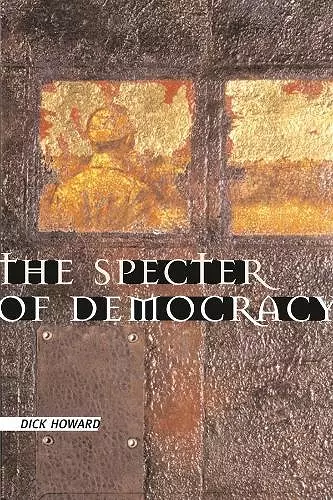The Specter of Democracy
What Marx and Marxists Haven't Understood and Why
Format:Paperback
Publisher:Columbia University Press
Published:9th May '06
Currently unavailable, and unfortunately no date known when it will be back

In this engaging and persuasive book, Dick Howard takes a critically innovative look at Marxism and its blind spots and rethinks the nature of democracy. He explores the attraction Marxism holds for intellectuals, examines two hundred years of democratic political life-focusing on the American and French Revolutions and the truly "revolutionary" aspects of those events-and rethinks Marx's contribution to democratic politics. Howard concludes that Marx was attempting a "philosophy by other means", and that, paradoxically, because he was such an astute philosopher Marx was unable to see the radical political implications of his own analyses. Howard offers a new way of thinking about democratic policy as a political ideal, positing that Marx could have seen this radical third way but did not. In this rethinking of Marxism and its blind spots, Howard uses a critical rereading of Marx as a theorist of democracy to offer a new way to think about this political ideal. He argues that it is democracy, rather than Marxism, that is radical and revolutionary, and that Marx could have seen this but did not.
Argues that the collapse of European communism in 1989 should not be identified with a victory for capitalism and makes possible a wholesale reevaluation of democratic politics in the US and abroad. This book examines two hundred years of democratic political life - comparing America's experience as a democracy to that of France.In this rethinking of Marxism and its blind spots, Dick Howard argues that the collapse of European communism in 1989 should not be identified with a victory for capitalism and makes possible a wholesale reevaluation of democratic politics in the U.S. and abroad. The author turns to the American and French Revolutions to uncover what was truly "revolutionary" about those events, arguing that two distinct styles of democratic life emerged, the implications of which were misinterpreted in light of the rise of communism. Howard uses a critical rereading of Marx as a theorist of democracy to offer his audience a new way to think about this political ideal. He argues that it is democracy, rather than Marxism, that is radical and revolutionary, and that Marx could have seen this but did not. In Part I, Howard explores the attraction Marxism held for intellectuals, particularly French intellectuals, and he demonstrates how the critique of totalitarianism from a Marxist viewpoint allowed these intellectuals to see the radical nature of democracy. Part II examines two hundred years of democratic political life-comparing America's experience as a democracy to that of France. Part III offers a rethinking of Marx's contribution to democratic politics. Howard concludes that Marx was attempting a "philosophy by other means," and that paradoxically, just because he was such an astute philosopher, Marx was unable to see the radical political implications of his own analyses. The philosophically justified "revolution" turns out to be the basis of an anti-politics whose end was foreshadowed by the fall of European communism in 1989.
If Marxist theory is to survive the debacle of Marxist practice, it will have to transform itself in more than superficial ways into a credible defender of radical democracy. Drawing on more than three decades of experience as one of America's foremost interpreters of French and German critical theory, Dick Howard goes a long way towards meeting this challenge. The Specter of Democracy is a primer for twenty-first-century political critique and a welcome reminder that radicalism and responsibility need not be antithetical terms. -- Martin Jay, author of the The Dialectical Imagination
ISBN: 9780231124850
Dimensions: unknown
Weight: unknown
368 pages